For the 2025 school year, there is 1 public high school serving 784 students in Branford School District. This district's average high testing ranking is 4/10, which is in the bottom 50% of public high schools in Connecticut.
Public High School in Branford School District have an average math proficiency score of 27% (versus the Connecticut public high school average of 33%), and reading proficiency score of 57% (versus the 53% statewide average).
Public High School in Branford School District have a Graduation Rate of 92%, which is more than the Connecticut average of 90%.
The school with highest graduation rate is Branford High School, with 90-94% graduation rate. Read more about public school graduation rate statistics in Connecticut or national school graduation rate statistics.
Minority enrollment is 33% of the student body (majority Hispanic), which is less than the Connecticut public high school average of 55% (majority Hispanic).
Overview
This School District
This State (CT)
# Schools
5 Schools
219 Schools
# Students
2,530 Students
166,353 Students
# Teachers
227 Teachers
13,569 Teachers
Student : Teacher Ratio
11:1
11:1
District Rank
Branford School District, which is ranked within the bottom 50% of all 197 school districts in Connecticut (based off of combined math and reading proficiency testing data) for the 2021-2022 school year.
The school district's graduation rate of 90-94% has decreased from 94% over five school years.
Overall District Rank
#111 out of 200 school districts
(Bottom 50%)
(Bottom 50%)
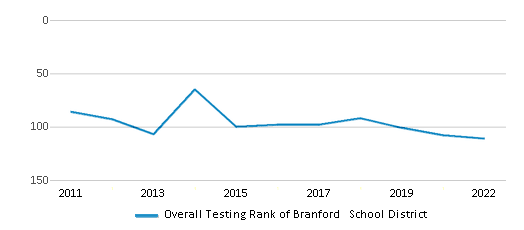
Math Test Scores (% Proficient)
44%
40%
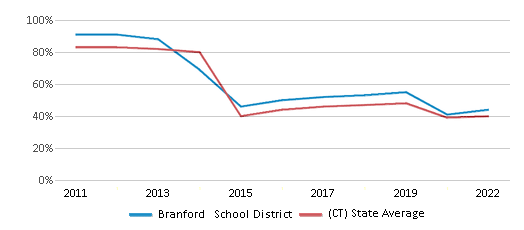
Reading/Language Arts Test Scores (% Proficient)
53%
50%
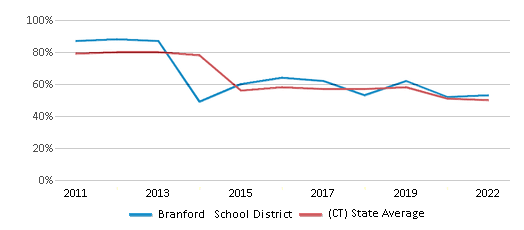
Science Test Scores (% Proficient)
47%
47%
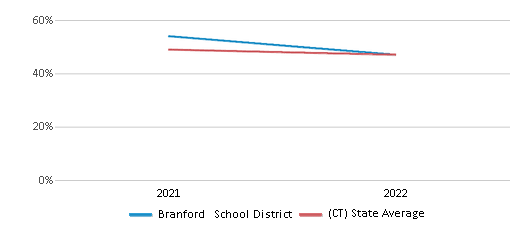
Graduation Rate
90-94%
89%
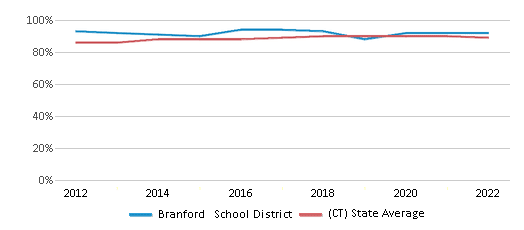
Students by Ethnicity:
Diversity Score
0.53
0.68
# American Indian Students
8 Students
426 Students
% American Indian Students
n/a
n/a
# Asian Students
169 Students
8,064 Students
% Asian Students
7%
5%
# Hispanic Students
421 Students
50,824 Students
% Hispanic Students
17%
31%
# Black Students
109 Students
24,621 Students
% Black Students
4%
15%
# White Students
1,681 Students
75,269 Students
% White Students
66%
45%
# Hawaiian Students
1 Student
165 Students
% Hawaiian Students
n/a
n/a
# Two or more races Students
139 Students
6,542 Students
% of Two or more races Students
6%
4%
Students by Grade:
# Students in PK Grade:
63
230
# Students in K Grade:
176
590
# Students in 1st Grade:
183
558
# Students in 2nd Grade:
184
566
# Students in 3rd Grade:
176
579
# Students in 4th Grade:
169
609
# Students in 5th Grade:
210
601
# Students in 6th Grade:
182
1,643
# Students in 7th Grade:
203
2,088
# Students in 8th Grade:
200
2,127
# Students in 9th Grade:
193
41,217
# Students in 10th Grade:
192
39,783
# Students in 11th Grade:
195
38,905
# Students in 12th Grade:
204
36,857
# Ungraded Students:
-
-
District Revenue and Spending
The revenue/student of $35,483 is higher than the state median of $26,157. The school district revenue/student has stayed relatively flat over four school years.
The school district's spending/student of $34,818 is higher than the state median of $25,225. The school district spending/student has stayed relatively flat over four school years.
Total Revenue
$90 MM
$12,920 MM
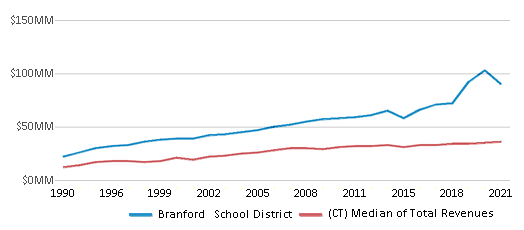
Spending
$88 MM
$12,459 MM
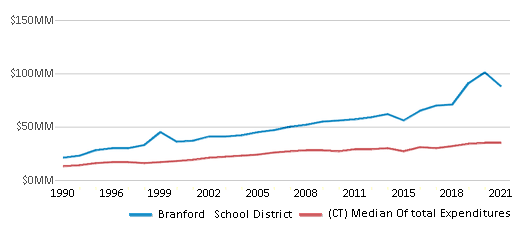
Revenue / Student
$35,483
$26,157
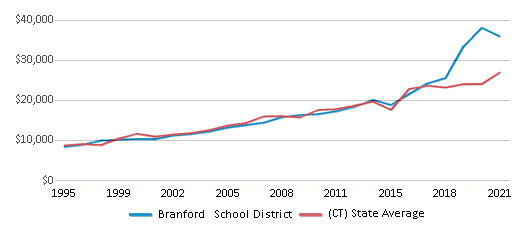
Spending / Student
$34,818
$25,225
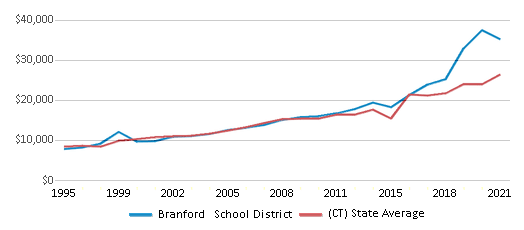
Best Branford School District Public High Schools (2025)
School
(Math and Reading Proficiency)
(Math and Reading Proficiency)
Location
Grades
Students
Rank: #11.
Branford High School
(Math: 25-29% | Reading: 55-59%)
Rank:
Rank:
5/
Bottom 50%10
185 East Main St.
Branford, CT 06405
(203) 488-7291
Branford, CT 06405
(203) 488-7291
Grades: 9-12
| 784 students
Recent Articles

Year-Round Or Traditional Schedule?
Which is more appropriate for your child? A year-round attendance schedule or traditional schedule? We look at the pros and cons.

Why You Should Encourage Your Child to Join a Sports Team
Participating in team sports has a great many benefits for children, there is no doubt. In this article you will learn what those benefits are.

White Students are Now the Minority in U.S. Public Schools
Increasing birth rates among immigrant families from Asia and Central and South America, combined with lower birth rates among white families, means that for the first time in history, public school students in the United States are majority-minority. This shift in demographics poses difficulties for schools as they work to accommodate children of varying language abilities and socio-economic backgrounds.





